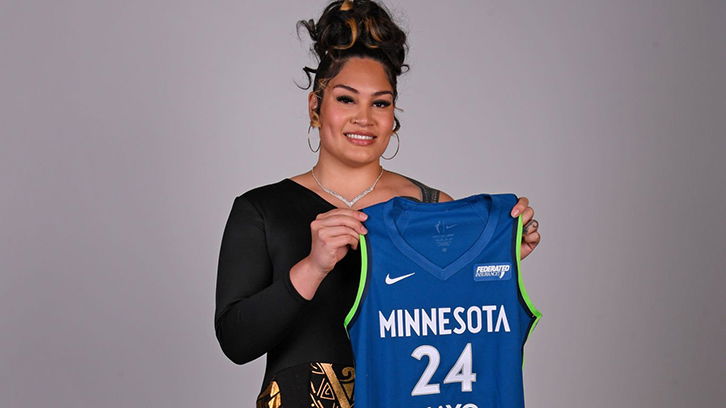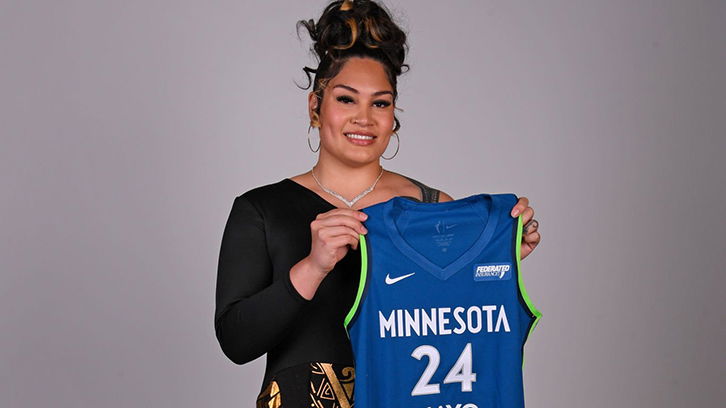
Getty
NEW YORK, NY – APRIL 15: Alissa Pili poses for a portrait after being drafted by Minnesota Lynx during the 2024 WNBA Draft on April 14, 2024 at the Brooklyn Academy of Music in Brooklyn, New York. NOTE TO USER: User expressly acknowledges and agrees that, by downloading and or using this photograph, User is consenting to the terms and conditions of the Getty Images License Agreement. Mandatory Copyright Notice: Copyright 2024 NBAE (Photo by Brian Babineau/NBAE via Getty Images)

Getty
NEW YORK, NY – APRIL 15: Alissa Pili poses for a portrait after being drafted by Minnesota Lynx during the 2024 WNBA Draft on April 14, 2024 at the Brooklyn Academy of Music in Brooklyn, New York. NOTE TO USER: User expressly acknowledges and agrees that, by downloading and or using this photograph, User is consenting to the terms and conditions of the Getty Images License Agreement. Mandatory Copyright Notice: Copyright 2024 NBAE (Photo by Brian Babineau/NBAE via Getty Images)

Getty
NEW YORK, NY – APRIL 15: Alissa Pili poses for a portrait after being drafted by Minnesota Lynx during the 2024 WNBA Draft on April 14, 2024 at the Brooklyn Academy of Music in Brooklyn, New York. NOTE TO USER: User expressly acknowledges and agrees that, by downloading and or using this photograph, User is consenting to the terms and conditions of the Getty Images License Agreement. Mandatory Copyright Notice: Copyright 2024 NBAE (Photo by Brian Babineau/NBAE via Getty Images)

Getty
NEW YORK, NY – APRIL 15: Alissa Pili poses for a portrait after being drafted by Minnesota Lynx during the 2024 WNBA Draft on April 14, 2024 at the Brooklyn Academy of Music in Brooklyn, New York. NOTE TO USER: User expressly acknowledges and agrees that, by downloading and or using this photograph, User is consenting to the terms and conditions of the Getty Images License Agreement. Mandatory Copyright Notice: Copyright 2024 NBAE (Photo by Brian Babineau/NBAE via Getty Images)
Alissa Pili had Minnesota Lynx fans on their toes in her rookie season. Though she spent much of the 2024 WNBA season on the bench, she delivered a few standout performances that hinted at her immense potential. “We’d better see more of her,” was the prevailing sentiment heading into her sophomore year. Yet, her court time has remained modest.
Watch What’s Trending Now!
Still, her impact transcends minutes. Drafted 8th overall by the Lynx in 2024, Pili joined one of the league’s top teams, an environment built for development and excellence. And beyond her skills, her presence alone in the WNBA holds cultural weight. Pili represents a deeply underrepresented community, and her journey is about more than basketball. Let’s dive into that.
Where is Alissa Pili from, and what is her nationality?
Pili was born in Anchorage, Alaska, to Heather and Billy Pili on June 8, 2001, and is naturally an American by nationality. For the first seven years of her life, she lived in Utqiagvik, aka Barrow, the northernmost city in the United States. Alissa spent the rest of her childhood in Anchorage. She played football as a lineman from third to eighth grade as the only girl in her league and started playing organized basketball at age eight.
Alissa attended Dimond High School in Anchorage, where she quickly became one of the most dominant high school athletes in state history. As a freshman, she led her team to a runner-up finish at the Class 4A state basketball tournament and eventually guided Dimond to two state championships. She set the Class 4A all-time scoring record and was named Alaska Gatorade Player of the Year three times.
Her brute strength has been her plus point ever since school days, as her coach mentioned. “I’ve been coaching for many years, and Alissa is a special athlete, the type we haven’t had in Alaska,” Dimond coach Jim Young said in 2016. “So strong for her age. Alissa can rep 135 pounds eight times on the bench press.”
Alissa Pili’s excellence extended well beyond the basketball court. She won 13 state titles across multiple sports, including four in volleyball, four in shot put, two in discus, and one in wrestling. Her remarkable multi-sport achievements earned her MaxPreps Female High School Athlete of the Year honors in both her junior and senior years, making her only the second two-time winner after Olympic swimmer Missy Franklin. Rated a five-star recruit by ESPN, Pili committed to play college basketball for the University of Southern California (USC).

Pili entered her freshman season at USC as the team’s starting forward. She made an immediate impact, averaging 16.3 points and 8 rebounds per game. Her outstanding performance earned her the Pac-12 Freshman of the Year award and a spot on the All-Pac-12 Team. In her sophomore year, she averaged 11 points and 3.8 rebounds per game, receiving All-Pac-12 honorable mention. During her junior season, she posted 7.8 points and 4.5 rebounds per game before transferring to the University of Utah. There, Pili further flourished, being named Pac-12 Player of the Year and earning All-Pac-12 honors after leading Utah to a share of the regular season conference title.
What is Alissa Pili’s ethnicity?
Alissa Pili is of Samoan and Inupiaq descent. Her mother, Heather Pili, is Native Alaskan, specifically from the Inupiaq community. The Inupiaq are Indigenous peoples native to Alaska’s Arctic regions, especially around the North Slope and Northwest Arctic Boroughs. Her father, Billy Pili, is Samoan, from the village of Aua in American Samoa. Samoan culture is part of the larger Polynesian cultural group. Being the first Polynesian player in the WNBA, Pili doesn’t take that platform for granted.
“It means everything to me. Growing up, my culture — I put that on my back. That’s something I’m very proud of: being able to represent my family’s name, Polynesian culture, and Indigenous Alaska native culture,” she has said. Pili isn’t shy about sharing her roots with others either. Her tattoo that runs down her leg is a tribute to her Polynesian heritage she holds closely. “I wear that with pride and I carry it with me in everything I do, and that’s what makes me want to be successful in this league,” Pili said.
Pili has also experienced racial incidents in her short career so far. After her final game with the Utes, twice on the night of Thursday, March 21, last year, people intimidatingly revved their truck engines and shouted the N-word at the team, the band, and cheerleaders as they entered and later exited a Coeur d’Alene restaurant in Idaho.
Despite facing difficulties throughout her career, she has made it to the WNBA and garnered support from her community. Many of the indigenous people travel to Minnesota games just for Pili and let her know that she is making a difference and carving new pathways not just for her but also for her community to follow.
Is Alissa Pili Christian?
Alissa Pili’s specific religious affiliation is not publicly known, and she has not identified herself with any particular faith. However, she has spoken about the importance of spirituality in her life and the many cultural traditions that have shaped her identity. Pili has acknowledged having a spiritual foundation and a belief in God, which she says has helped guide her through challenges as a student-athlete.
She said, “Definitely just my belief in God first and foremost. College, especially being an athlete, is super tough, so having that spiritual side and leaning into that has definitely helped me through tough times.” While she has not spoken in detail about her religious practices, it is clear that her spiritual outlook plays a meaningful role in her personal and athletic journey.
Alissa Pili brings a rare and powerful background to the WNBA, shaped by the richness of her Inupiaq and Samoan heritage. Few players in the league can claim such a culturally diverse identity, and Pili is not only building a name for herself as an athlete but also carrying the hopes and pride of her community. While she has yet to see significant playing time with the Minnesota Lynx, her international experience and the opportunity to train alongside elite players like Napheesa Collier have contributed to her steady development. Her presence in professional basketball resonates far beyond the court, serving as inspiration to many back home and laying the foundation for a legacy rooted in both talent and representation.


